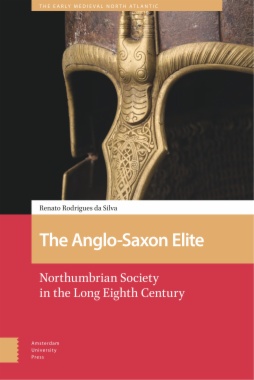In all of the literature on Anglo-Saxon England, rarely has the question of social class been confronted head-on. The Anglo-Saxon Elite: Northumbrian Society in the Long Eighth Century draws upon recent research into topics such as religious practice, emotions, daily life, and intellectual culture to investigate how the aristocracy of Northumbria maintained social dominance over wider society. Moreover, this monograph suggests that the crisis that brought an end to Northumbria as an independent kingdom was the product of the social contradictions produced by the ruling class as social domination developed over time. The analysis is divided into three broad parts – production, circulation, and consumption – both as a nod to Marxist historiography and also to signal a commitment to a methodology that situates the subject within a global context.
- Cover
- Table of Contents
- Acknowledgements
- Abbreviations
- Introduction
- 1. The Aristocracy’s Appearance
- Introduction
- 1. Nouns for aristocrats: labels
- 2. Aristocrats as warriors
- 3. Aristocratic Women
- 4. Social Mobility? The cases of Imma and Caedmon
- 5. The crystallization of the aristocracy: the Durham Liber Vitae
- Conclusion
- Bibliography
- 2. Production: Classes and Class Relations
- Introduction
- 1. Concepts and Definitions
- 2. Why is the eighth century a ‘long’ one?
- 3. Forces of Production and Means of Production, at Sherburn (N. Yorks)
- Conclusion
- Bibliography
- 3. Circulation
- 1. Land donation
- 2. Circulation, Coins and Coinage
- Conclusion
- Bibliography
- 4. Time, History and Class through narratives
- Introduction
- 1. History and Ideological reproduction
- 2. Narratives, Form and Content
- 3. The past and its senses in Anglo-Saxon Society: the vernacular and Latin
- 4. Bede and his works
- 5. The Historia Regum
- Conclusion
- Bibliography
- 5. Consumption: Aristocratic Eating
- Introduction
- 1. Types of evidence available
- 2. Fasting and Feasting
- 3. Flixborough
- Conclusion
- Bibliography
- 6. The End: Death
- Introduction
- 1. Death as a form of time reckoning
- 2. Periods, Chronology and their meaning in Archaeology
- 3. Clerics, jewellery and status
- 4. Wills: reproduction through death
- 5. Rites of Death
- Conclusion
- Bibliography
- Conclusion
- Index
- List of Figures
- Figure 1 – The Coppergate Helmet Inscription. http://www.yorkarchaeology.co.uk/artefacts/copphelm3b.htm. © York Archaeological Trust. Image courtesy of York Museums Trust: https://yorkmuseumstrust.org.uk/: CC BY-SA 4.0
- Figure 2 – Comparison between the list of the names of dukes or kings (15r, left) with that of queens and abbesses (16r, right), showing how gold was used more frequently on the first list. The Durham Liber Vitae. © The British Library Board, Cotton Domit
- Figure 3 – Æthelred’s name, below Oslaf and above Æthelbeorht. The Durham Liber Vitae. © The British Library Board, Cotton Domitian A. VII, fol. 15r, http://www.bl.uk/manuscripts/Viewer.aspx?ref=cotton_ms_domitian_a_vii_f015r.
- Figure 4 – The ‘Harrogate Coin’, recorded in the Fitzwilliam’s Museum Database as 2012.0025. J. Naylor and M. Allen, ‘A new variety of the gold shilling of the “York” group’, Studies in Early Medieval Coinage: Volume III, p. 144. Image credit and copyrigh
- Figure 5 – The ‘Moore Bede’ which is probably the earliest copy of the HE. Cambridge University Library, MS Kk.5.16, fol. 121v. Available at http://cudl.lib.cam.ac.uk/view/MS-KK-00005-00016/250 (accessed 3 May 2021). Reproduced by kind permission of the S
- Figure 6 – folio 3 of the ‘Leningrad Bede’. (Saint Petersburg, National Library of Russia, Lat. Q. v. I. 18 fol. 3v). Copyright: National Library of Russia (NLR), reproduced with kind permission of the NLR.
- Figure 7 – Hartlepool 06, Durham. Measurements: L. 29.5 cm (11.5 in); W. 25.4 cm (10 in); D. 7.6 cm (3 in); CASSS, Vol. 1 – County Durham and Northumberland, pp. 100–101, Pl. 85.444. http://www.ascorpus.ac.uk/corpus_images.php?set=203 (accessed 2 June 201
- List of Tables
- Table 1 – Kings and coins (from single finds)
- Table 2 – Archbishops and coins (from single finds)
- Table 3 – Moneyers
- Table 4 – Moneyers who produced coins for king and archbishops
- Table 5 – Coins of West Heslerton obtained from spits
- Table 6 – Coins of West Heslerton obtained from stratified deposits
- Table 7 – Totals
- Table 8 – Vocabulary for the aristocracy found in the Historia Regum.

